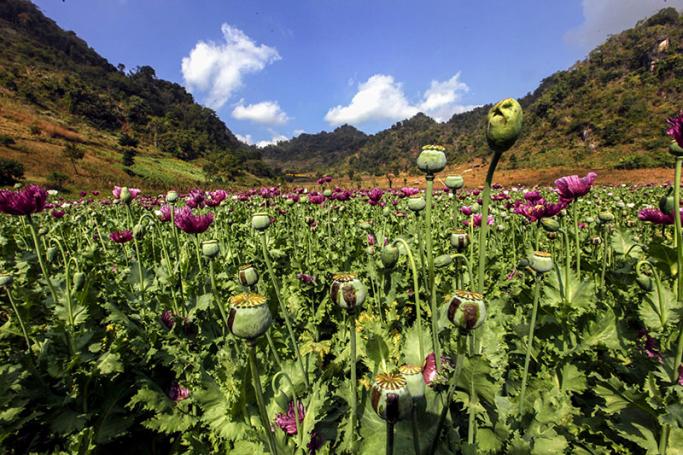In an effort to raise awareness and strengthen Myanmar’s response to the production, trafficking and use of illicit drugs, United Nations Office on Drugs and Crime (UNODC) and the Government of Myanmar held a number of high-level policy discussions today.
Speaking at an event to present the UNODC 2016 World Drug Report, Mr. Jeremy Douglas, UNODC Regional Representative for Southeast Asia and the Pacific and H.E. Lt. Gen. Kyaw Swe, Minister of Home Affairs, highlighted the need for a balanced approach addressing both demand and supply to address the challenges faced by Myanmar and other members of the international community, according to a UN Statement.
“I would like to commend the Government of Myanmar for its efforts to address significant drug challenges, especially in Shan State and remote border areas,” said Mr. Douglas. “We are also very pleased with the direction taken by Myanmar towards reforming national drug policy. UNODC will continue to support the Government in this process which will serve as a good example for other countries in the region.”
“With UNODC support, we are currently planning a nationwide survey on drug use in Myanmar which will be the first ever survey of its kind in the country” Lt. Gen. KyawSwe said. “The resulting knowledge will pave the way to formulating an effective national response taking into account use patterns within different parts of the country.”
Similar to other countries in Southeast Asia, Myanmar faces challenges from increasing levels drug supply. The 2016 World Drug Report identifies the region as a large and growing market for methamphetamine. Quantities seized in East and Southeast Asia almost quadrupled between 2009 and 2014 and preliminary data for 2015 suggest seizures have reached yet another peak. Furthermore, the area under opium poppy cultivation in the Golden Triangle tripled over the past ten years, with seizures of heroin rising in 2015. The number of persons admitted for drug treatment in the region has also increased rapidly.
“Unfortunately, Myanmar is part of a burgeoning regional illicit drug market and the country continues to be a major source of methamphetamine, opium and heroin for Southeast Asia”, Mr. Troels Vester, UNODC Country Manager said at the event. “Like other countries in the region, it continues to struggle to cope with the immense challenges posed to public health and development”.
At a subsequent briefing to Members of the Pyidaungsu Hluttaw – the national legislative assembly – UNODC presented the situation and discussed a number of drug policy options addressing law enforcement, justice, international and regional cooperation, supply, market demand, and treatment and care. “We have today had the opportunity to talk to policy makers about a new national drug policy that would rest on a balanced and comprehensive approach, and promote a healthy and safe environment for the people of Myanmar,” Mr. Douglas said at the briefing. “We also discussed the increasing connectivity between Myanmar and its neighbours and helping to facilitate international cooperation, especially along border areas.”
Under its Country Programme for Myanmar and the Regional Programme for Southeast Asia, UNODC cooperates closely with the Government of Myanmar to strengthen capacities for cross-border cooperation against illicit drug trafficking and to review drug-related legislative frameworks and policies. UNODC also supports a major initiative to provide alternative means of income to opium-growing farmers in Shan state.
You are viewing the old site.
Please update your bookmark to https://eng.mizzima.com.
Mizzima Weekly Magazine Issue...
14 December 2023
Spring Revolution Daily News f...
13 December 2023
New UK Burma sanctions welcome...
13 December 2023
Spring Revolution Daily News f...
12 December 2023
Spring Revolution Daily News f...
11 December 2023
Spring Revolution Daily News f...
08 December 2023
Spring Revolution Daily News f...
07 December 2023
Diaspora journalists increasin...
07 December 2023
Military ship and helicopters seen at China's closest point to Taiwan












